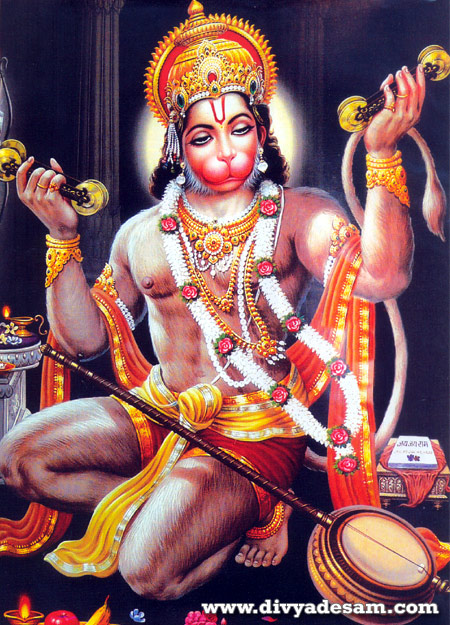SrI:
SrImatE rAmAunjAya nama:
SrImath varavara munayE nama
In her second pAsuram, AndAL establishes that bhagavath kalyANa guNAnubhavam is achievable only at bhUlOkam and not SrI vaikunTam. Below are glimpses of thiruppAvai vyAkyAnam for select words of the first pAsuram that are relevant to the context.
“nIrADa pOdhuvIr...”
AndAL, in her first pAsuram, says “nIrADa pOdhuvIr pOdhuminO nErizhayIr”. Here, AndAL invites her friends for nIrATTam. The term “nIrADa” refers to bhagavath kalyANa guNAnubhavam-that is, enjoying the auspicious qualities of emperumAn. This bliss attained from such an anubhavam is referred to as ‘paripUrNa brahmAnubhavam’. Can such an anubhavam be experienced at bhUlOkam or paramapadham?
emperumAn at paramapadham
At paramapadham, where emperumAn is worshipped by nithyargaL and mukthargaL, the omnipotence/supremacy (parathvam) of emperumAn is predominantly manifested. emperumAn is always complete with respect to his guNAs. Yet, given the eminence of the residents of paramapadham, there is really less need for emperumAn to manifest his other kalyANa guNAs such as sowlabhyam (approachableness/ eLimai-thanathvam) and karuNai (mercifulness) since the nithyAs and muktAs are the embodiment of complete knowledge and are constantly absorbed in the devotional service of emperumAn and pirAttimArgaL. The manifestation of soulabhyam, sousheelyam, dayai, karuNai etc. assume more relevance at the material world (bhUlOkam) and hence, emperumAn manifests such guNAs during his avatArams to uplift the nithya samsArIs. Given this, emperumAn’s kalyANa-guNAnubhavam is only possible at bhUlOkam!
The nithyasUrIs descend to bhUlOkam
Letting go their paramapadha anubhavam, the nithyasUrIs desire to enjoy the kalyaNa guNAs of emperumAn. To do so, they descend to thiruvEngaDam from the transcendental abode of paramapadham. Eager and enthusiastic about bhagavth kalyANa anubhavam, they bring with them beautiful flower garlands to offer to emperumAn and seeing emperumAn’s wonderful kalyANa guNAs, the flowers from the garlands begin to fall down. AndAL, in her nAchchiyAr thirumozhi, aptly says, “vEngaDaththai pathiyAga vAzhvIzhgAL”.
After completing His pastimes in SrI rAmAvatAram and when returning to paramapadham, SrI rAma ppirAn asks thiruvaDi (SrI hanumAr) to join Him along with His other associates to paramapadham. Hearing this, thiruvadi refused to go to paramapadham right away. He said, “bhAvO nAn yatra gachchati”- thiruvadi solely desired to enjoy the kalyANa guNAs of SrI rAma by way of listening to SrI rAmAyaNam repeatedly; at places where SrI rAmAyaNam is sung/discussed, thiruvadi desired to be there and meditate upon SrI rAma’s pastimes. In this way, thiruvadi took great pleasure in enjoying the vibhava form of emperumAn at bhUlOkam.
The gOpIs rejoice kriSHNAnubhavam
The gOpIs, who were born in thiruvAyppADi at the time of kriShNAvatAram, were extremely fortunate to enjoy kannan emperumAn. These gOpIs are referred to as “sirumIrgAL” in AndAL’s first pAsuram. They are called so because they shared the same youthfulness of kannan owing to which they neither depended on the male folks of the society such as those married (connoting anya shEShatvam) nor did they think they are independent and could protect themselves such as those who were aged (connoting svAtantryam). Given this, the young gOpIs were blessed with kannan’s kaTAksham. Though born in this material world, which is nothing but “iruL tharumA gyAlam” (one covered by the darkness of ignorance), the gOpIs had the topmost fortune of enjoying kannan. And, hence, they are referred to as “bhAgyavathigAL”.
AzhwArs desire thiruarangam
Instead of yearning for paramapadha anubhavam, thonDaraDippoDi AzhwAr and thiruppAn AzhwAr go a step ahead, asking for thiru-aranga anubhavam. thonDaraDippoDi AzhwAr says, “achchuvai perineum vEnDEn arangamA nagaruLAnE”- AzhwAr says that he desires to be born in thiru-arangam to enjoy thiru-arangannAthan. Similarly, thiruppAn AzhwAr says “en amudinai kanDa kangaL matronrinai kAnAvE”- AzhwAr says that his eyes, which have seen the beautiful thiru-aranganAthan, are now blind to anything/anyone else in the world. Such was their love and devotion toward periya perumAL. In this way, the AzhwArs derived immense pleasure from enjoying the archA thirumEni of emperumAn at thiru-arangam.
TRANSLATED from the works of Īrāyirappadi (SrI. Āijananyāchāryar SwAmi), Mūāyirappadi (swAmi Periyavāchchān Piļļai) & Ārāyirappadi (swAmi Azhagiya Manavāļā Perumāļ Nāyanār).
AndAL thiruvadiklaey sharanam | emperumAnAr thiruvadikaley sharanam





No comments:
Post a Comment